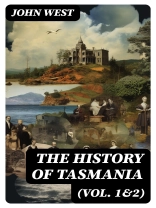In ‘The History of Tasmania (Vol. 1&2)’, John West embarks on a meticulous exploration of Tasmania’s past, deftly weaving together social, political, and economic threads that define the island’s unique identity. West’s literary style is characterized by a rigorous attention to detail and a narrative that balances academic rigor with engaging prose, making the text both informative and accessible. Published in the mid-19th century, this seminal work is situated within a context of burgeoning Australian nationalism and is pivotal in framing Tasmania’s role in the wider historical narrative of Australia. John West, a key figure in Australian historiography and journalism, was deeply influenced by his convictions regarding the importance of documenting and understanding Australia’s indigenous and colonial history. His personal experiences and observations throughout Tasmania informed his passionate writing, positioning him as a critical voice in advocating for a more nuanced understanding of Australia’s complex past. West’s commitment to shedding light on the experiences of Indigenous peoples and colonial subjects is a reflection of his progressive ideals. For readers seeking a foundational text in Australian history, ‘The History of Tasmania (Vol. 1&2)’ is indispensable. West’s thorough research and eloquent storytelling not only offer a captivating read but also challenge contemporary readers to reflect on the legacies of colonization and cultural memory. This work is essential for historians, students, and anyone interested in the rich tapestry of Tasmania’s history.
Sobre o autor
John West (1809–1873) was an English-born writer and clergyman, known for his comprehensive and seminal work on the early history of Tasmania. His two-volume treatise, ‘The History of Tasmania (Volume 1 & 2)’, remains a cornerstone in Australian historiography, offering an in-depth examination of the island’s colonial period, including the origins of European settlement, relations with the indigenous populations, and the development of societal institutions. West’s scrupulous approach to research and his eloquent narrative style have earned him a distinguished place among Australian historians. He wrote with a keen analytical eye and a compassionate approach to the ethical issues of his time, qualities that have helped his work endure in historical circles. Prior to his work as a historian, West was a prominent Congregationalist minister and a leading figure in the anti-transportation movement, advocating against the continuation of sending convicts to Australia. He emigrated to Tasmania in 1838, where his experiences and observations would later form the bedrock of his historical contributions. His writing, rich with detail and insight, not only records the events of the time but also provides readers with a sense of the societal and moral climates that shaped early Tasmania. West’s commitment to truth and moral reflection in history remains an exemplary model for scholars and historians.












